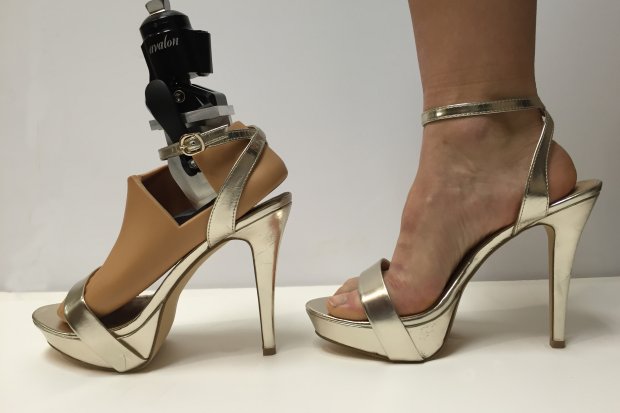New Inventions Prosthetic Foot Developed For High Heel Use
Students at Johns Hopkins University Whiting School of Engineering have developed a prosthetic foot called Prominence that can adapt to high heel shoes.
Fashionistas who have lost a foot or leg due to injury or disease may now be able to keep up with all the latest shoe trends thanks to five students at Johns Hopkins University Whiting School of Engineering, who developed a prosthetic foot called “Prominence” that adapts to high heels up to 4 inches high.
The students were able to develop the 28-layer carbon fiber footplate prosthetic in two semesters using both mathematical equations and tests by machines and people. The result is a lightweight prosthetic that maintains its position without slipping, can support a person up to 250 pounds, is slender enough to fit inside women’s shoes and has an adjustable ankle.
“An adjustable ankle is useful in contexts even beyond high heels,” says Alexandra Capellini, a Johns Hopkins University student who lost her right leg to bone cancer and participated in the prosthetics study. “Ballet flats, sneakers, boots, and high heels especially, all very in height, so an adjustable ankle opens up opportunities to wear a variety of shoes.”
But the “Prominence” inventors stress their project goes beyond fashion. In addition to women who have suffered lower-body limb losses and want to wear heels again, the team hopes their prosthetic design will help the nearly 2,100 American women who have lost a foot or leg in military service.
“High heels have become an integral part of the female lifestyle in modern society, permeating through all aspects of life — professional and social,” the students wrote in their final report. “For female veterans of the U.S. armed services with lower limb amputations, that seemingly innocuous, but so pervasive, and decidedly feminine part of their lives is gone.”
As for whether or not “Prominence” will soon be hitting the market, Nathan Scott, senior mechanical engineering lecturer at Johns Hopkins University, says: “I think the final prototype produced showed the way forward. As usual, we just need to go around the design and prototyping loop one more time.”
Notice concerning medical entries:
Articles having medical content shall serve exclusively for the purpose of general information. Such articles are not suitable for any (self-) diagnosis and treatment of individual illnesses and medical indications. In particular, they cannot substitute for the examination, advice, or treatment by a licensed physician or pharmacist. No replies to any individual questions shall be effected through the articles.






